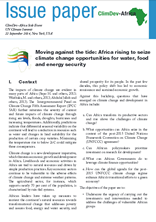Moving against the tide: Africa rising to seize climate change opportunities

Context
The impacts of climate change are evident in many parts of Africa (Sepo H. and others, 2013; Waithaka, M. and others, 2013; Abdulai Jalloh and others, 2013). The Intergovernmental Panel on Climate Change Fifth Assessment Report (IPCC 5AR) further reiterates the severity of current and future impacts of climate change through rising sea levels, floods, droughts, hurricanes and increasing temperatures. Additionally, predictions indicate that differential seasonal variability on the continent will lead to a reduction in resources such as water and changes in land suitability for the production of certain crop varieties. Minimizing the temperature rise to below 2oC could mitigate these consequences.
Climate change is a new development imperative, which threatens economic growth and development in Africa. Livelihoods and economic activities in Africa are tied to natural resources and driven by simple production practices. Key economic sectors continue to be vulnerable to the adverse effects of climate change and extreme weather patterns. The agricultural sector, for instance, which supports nearly 70 per cent of the population, is characterized by rain-fed systems.
African leaders have taken up measures to reorient the continent’s natural resources towards transformational change that addresses poverty and assures food, energy and water security, and shared prosperity for its people. In the past few decades, this policy shift has led to economic renaissance and sustained economic growth.
Against this backdrop, questions that have emerged on climate change and development in Africa include:
- Can Africa transform its productive sectors and rise above the challenges of climate change?
- What opportunities can Africa seize in the context of the post-2015 United Nations Framework Convention on Climate Change (UNFCCC) agreement?
- Can African policymakers prioritize investment on research for development?
- What can African Governments do to leverage climate finance opportunities?
- How can the global agenda for the post-2015 UNFCCC climate change regime enhance Africa’s transitional efforts to a green economy?
The objectives of the paper are to:
- Underscore the urgency of carrying out the investments and interventions needed to address the challenges of vulnerable African groups
- Moving against the tide: Africa rising to seize climate change opportunities for water, food and energy security
- Highlight the climate change opportunities available for transforming agriculture, taking into account its linkages to other key economic sectors, such as energy and water resources
- Help create an understanding among policymakers that climate change does not only involve challenges, but also opportunities, which can help transform Africa; and that there is need to focus on those opportunities in order to foster long-term resilience to the effects of climate change
- Create an understanding, based on the key findings of IPCC AR5, that transformation and poverty reduction in Africa can be achieved through a nexus approach in addressing agriculture, water and energy together
- Contribute to strengthening Africa’s position and ensuring that its interests are captured in the post-2015 climate change arrangement.